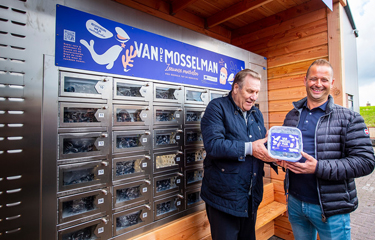Dutch latching on to mussel vending machines as season opens

The unveiling of the first mussel-vending machine in Yerseke, the Dutch capital of mussel farming, helped to kick off the new ground-culture mussel season this summer.
Former Dutch national soccer player Jan Boskamp pulled the first pack from the machine last month.
Located in Yerseke’s harbor area, the refrigerated machine has 45 compartments and allows consumers 24-hour access to fresh mussels sold in two-kilogram modified atmosphere packs. It is open for business every day except Sunday, in line with local trading rules.
The initiative was the brainchild of the Steketee family, whose company De Mosselkwekerij, has been growing mussels in the Oosterschelde for many decades. The machine is being leased as part of a three-year project to promote the industry, set up by the Dutch Mussel Bureau, with a EUR 25,000 (USD 29,000) grant from the European Union.
Third-generation family member Jos Steketee has brought new ideas into the business and founded a new company, Mosselman, five years ago, to sell mussels directly to consumers.
“We think there is a very good market for the vending machine, which will enable us to showcase the excellent quality of our mussels to the public. And, if the business does well, perhaps we can add sauce, vegetables, herbs, or fries as well in the future,” Steketee said.
Tilly Sintnicolaas from the Dutch Mussel Bureau told SeafoodSource that mussel vending machines are well-known in neighboring Belgium, and the French are used to buying oysters from a machine, but selling fresh shellfish in this way has not yet caught on in the Netherlands.
“People happily buy food items such as asparagus, strawberries, and ice cream from vending machines, so we hope that the mussel machine will catch on and be the start of an exciting new trend,” she said.
Sintnicolaas was also responsible for using technology of a different type, when the first bag of new season mussels was carried ashore from the harvest boat by a transport drone.
“The mussels were destined for a new moules-frites pop-up restaurant in Zeebrugge in Belgium, which enjoyed the added publicity the occasion generated,” she said.
According to Addy Risseeuw, foreman of the Zeeland mussel farmers, the mussels have an excellent meat content this season, and are better than they have been for years, so the industry is looking forward to a profitable year.
“Despite lockdowns put in place because of [COVID-19], we saw retail sales in Belgium and the Netherlands rise sharply in 2020 and we hope this will continue,” Risseeuw said. “Mussels are a sustainable, high-quality protein product with a very low footprint, that is also tasty and easy to prepare. We see many opportunities in both countries to inspire younger consumers to start eating and enjoying them.”
Through the end of September, the center of Yerseke has once again been transformed into a mussel and oyster boulevard, with boat trips and guided tours, live music, culinary walks, food trucks, shellfish tours for children, and art exhibitions. This year, a specially commissioned coffee table book is celebrating the history of the local seafood industry.
Annual production of Zeeland mussels is currently around 50,000 metric tons and plans are in hand to replace the fishing of mussel seed with seed-capture installations and to expand opportunities for more offshore rope-grown installations, with a target date for a substantial increase in production of 2030.
Photo courtesy of De Mosselkwekerij






Share